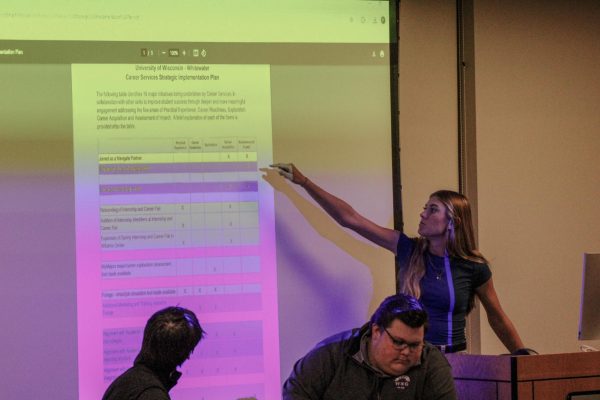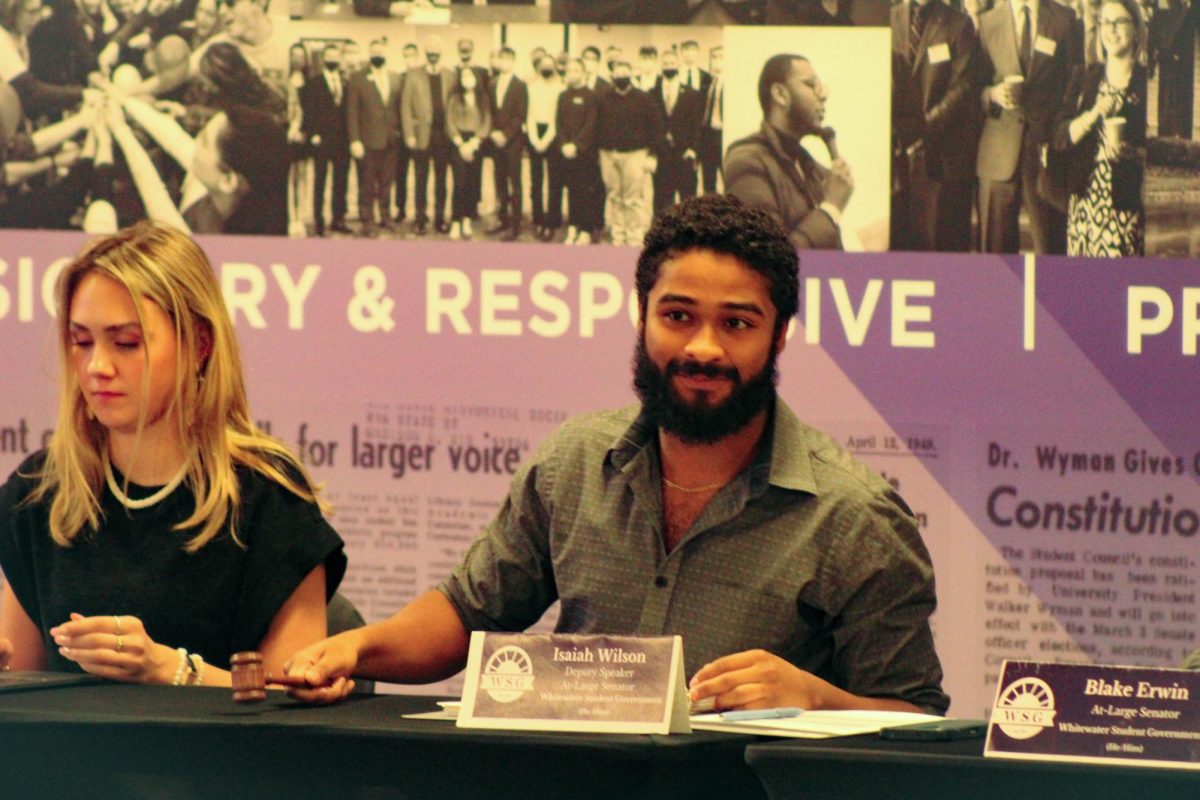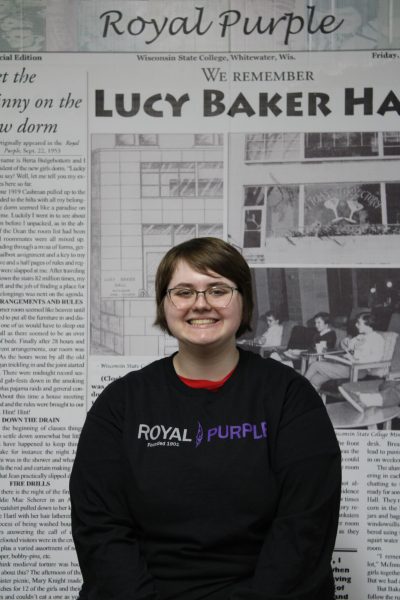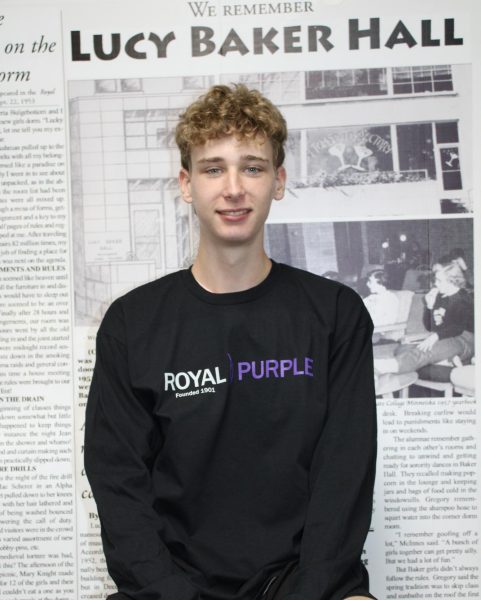The Whitewater Student Government (WSG) has called upon the office of Career Services for action regarding desired reforms for improved effectiveness of programming, and the office has responded by assembling a student advisory board.
WSG has been hard at work pushing to make these changes reality. The changes they are looking for from Career Services would help serve students as they prepare for post-graduation life.
As stated in official WSG legislation, the organization has voiced the student body’s concerns regarding Career Services for years. Additionally, the last three years have involved thorough data collection and consistent meetings between the two entities.
Such data collection included an analysis of five other schools within the Universities of Wisconsin system, namely Eau Claire, La Crosse, Oshkosh, Platteville and Stout.
The results of this analysis showed that most of the other institutions, UW-Stout in particular, had more job offerings and programming in their respective career areas.
WSG Director of Academic Affairs Abbie Reiser stated that student feedback was key in spurring the movement to improve Career Services.

“We really just wanted to take action because our role in student government is to take that feedback that we get from students and take action on it,” Reiser said. “We’re just trying to make the student experience better.”
Reiser is one of the WSG members who is leading the effort alongside Director of Student Affairs Jordyn Robinson.
WSG also expressed concerns about low student engagement with Career Services. More data was collected and the results showed that a low percentage of students were attending programming and meetings with their career advisers.
According to data provided by Career Services, 18% of students in the College of Business and Economics met with their advisers. Of students in the College of Arts and Communication 31% did the same.
Turnout was reported to be lower in the College of Education and Professional Studies and the College of Letters and Sciences, with these rates being 7% and 5%, respectively.
Robinson mentioned that many students were informing him that they did not know who their career adviser was, and this information encouraged him to act.
“We took an approach of truly wanting to understand what was going on over there,” Robinson said. “We came from a standpoint of understanding and collaboration.”
Alongside collecting data and fostering dialogue with Career Services, WSG members put together the Career Services Strategic Implementation Plan. This plan consists of 16 elements of improvement that have been or are hoped to be done.
Director of Career Services Joshua Reed believes that changes can be made to better the department’s offerings.
“We’re always looking to be innovative and to find new ways to increase student engagement,” Reed said. “I’m always open to ideas and thoughts, as long as they’re presented to me as ideas and things that we can take into consideration.”
Reed acknowledged WSG’s usage of data to highlight their concerns but emphasized that some of the data may not tell the entire story. Reed used the Career Fair Bingo as an example.
According to Reed, the Career Fair Bingo was filled to capacity for the last three years. However, WSG’s data showed that only 2% of students attended the program.
“There aren’t any programs we’re going to put on that are for over 10,000 students,” Reed said. “I would say in the last three years, which isn’t told on the documentation that they may have utilized, is that all of these events have grown.”
In collaboration with WSG, Career Services is creating a student advisory board. This board, according to Reiser, will include students from each academic college who wish to share feedback about their experiences with Career Services.
Robinson stated that more communication is one of the changes that he is seeking to implement in the Career Services department.
“We’re looking to be advocates for Career Services of the work that they do,” Robinson said. “We’re looking to be able to collaborate and speak to the work that’s going on. We want to make sure that it’s meeting the needs of the students in 2024.”
WSG suggested five areas of development for Career Services, those being practical experience, career readiness, exploration, career acquisition, and assessment of impact. This document also stated the organization’s goals for the department.
On Oct. 7, WSG held a session that included a vote on the Career Services Call to Action bill. The bill passed unanimously, and WSG members burst into applause.
Passing this bill was a culmination of years of hard work for WSG, and Reiser expressed excitement over the vote’s result.
“[The student advisory board] is going to be really good because then there’s more representation of students and more feedback and opinions can be put into effect,” Reiser said. “We can do these changes that we are wanting for the student body.”
Robinson also expressed his excitement over the unanimous decision while also emphasizing his feelings about the future.
“It’s always a testament to the amount of work that we put in behind the scenes, a lot of work that we put in to gain the facts and make sure that we’re doing our part,” Robinson said. “I’m excited to continue to work collaboratively and continue to take steps forward.”
Reed shares Reiser and Robinson’s feelings and stated that Career Services consists of a dedicated team. Reed mentioned that the team is excited about providing their services to students.
“Our student governance has shown dedication to ensure our students have the necessary resources to be successful in their career endeavors,” Reed said. “We in Career Services share that vision and look forward to strengthening and building a collaborative relationship to enhance our services through student input.”
WSG’s bill signifies a step in the right direction for Career Services, but much more work remains to be done. With the student advisory board coming to fruition soon, there will be an opportunity for students to share their perspectives.
The partnership between WSG and Career Services demonstrates their willingness to improve student services. Both entities have put in a significant amount of time and effort to make these changes. With collaboration ongoing, more milestones are sure to be reached.



